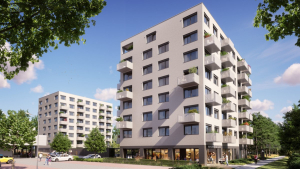
Angelika Kliś, Member of the Board of ATAL, one of the leading Polish residential developers, talked to Property Forum about the current boom in the residential sector, incoming challenges and the forecasts for 2024.
Congratulations on your very good sales performance in 2023 - you more than met your sales targets for the year and found buyers for 2,833 apartments. 12 months ago, in January, did you expect this year to be so good?
The assumptions were much more cautious, but there was also more and more talk about the incoming buyer support program. We decided to prepare for this and launched our own, proprietary “Czas na Mieszkanie” (‘Time for Apartment’) program. While waiting for the market to settle or for the announcement of the terms of any state subsidies, customers were able to reserve flats with a price guarantee and a final contract deferred for many months. In addition, without incurring withdrawal costs.
In retrospect, I can say that this was a very good move, as this tactic brought us many customers. It was a kind of win-win bet, as the precautionary customers avoided a kind of race for available apartments and we, in turn, achieved our sales targets in the first and second quarters of last year. Significantly, other companies also followed suit, taking inspiration from our solutions.
Ultimately, the entire industry was surprised in a positive way in 2023. Our proof is in the contracting results you cited and the company's valuation, which approximately doubled year-on-year.
In your opinion, does the new “Mieszkanie na Start” (‘Apartment for a Start’) government support programme have a chance to repeat the rather unexpected success of the “2% Safe Loan” and sustain demand at the current level?
This conversation comes at a time when we do not yet know the final shape of the solutions planned. Therefore, I would prefer to wait with a more detailed commentary until the new coalition's housing bill proposals are at a more advanced legislative stage.
At ATAL, we are of the opinion, which is also communicated by the president of our company, Zbigniew Juroszek, that supporting selected groups of buyers is definitely the right direction. It makes it easier to meet the fundamental need for housing for young people and families who are planning their first or next child. Acquiring ownership of housing also gives these people not only the stability that is so important when starting a family but also builds their capital.
However, the government, while working on forms of demand support, should also propose measures to support the supply side. I am referring here to the release of plots of land from state resources, as well as deregulation and simplification of procedures. The lack of progress on these issues hampers the development of housing in Poland and has an impact on the increase in residential prices.
What about cash buyers? In your opinion, will buying apartments for rent remain an attractive investment option in 2024?
Investing in apartments has been, is, and will continue to be a way of protecting capital, or multiplying it. Investing funds in real estate has a long tradition and it is, as we can see in the long term, a good investment. Even during the credit crunch, we had a fair share of cash customers. They have clear goals and are able to pay more for a flat in a great location and a better standard. It is not only about the rate of return on a potential rental but also about the overall attractiveness of a property over time and the increase in its value. In ATAL's offer, everyone will find an apartment to suit their needs. However, premium projects must take into account the expectations of more demanding buyers.
In 2023, municipal offices in the largest agglomerations issued around 25 per cent fewer building permits than the year before. Is there a shortage of land for development, are developers limiting supply, or is there another reason for this state of affairs?
Lack of land and protracted official procedures are just two of the reasons, although certainly very important. I would also add to this the disappointing practice in the use of the ‘lex developer’ bill. In many cases, it simply does not work as it could, and the local authorities that were supposed to benefit from it are building very little anyway.
Supply was and is also lower because preparing a development is a time-consuming process. So we did not see the boom effect immediately in the permit statistics. Finally, and in fact above all, the issue of capital. The times when it was possible to finance a large part of an investment from customer prepayments are over. Today, it is much more difficult for small and medium-sized developers to build, who are largely forced to finance their operations with commercial credit. At its current interest rate, this may simply not pay off, or it no longer looks as attractive to bear the effort and investment risk that this business is burdened with. ATAL has stable and financially favourable sources of capital, so we act regularly rather than impulsively toward the market. We are building and will continue to build a lot in order to keep delivering new projects to the market, for different groups of customers.
Can we expect an increase in the cost of building materials and general contracting due to the prosperous market?
At the moment, we are seeing price stabilization in the materials market. However, it should be remembered that, as I mentioned, the investment process is stretched over time, so this may change when new construction comes in. Besides, residential construction is only a part of this sphere of the industry that has a demand for materials. There is also infrastructure investment, industrial investment, etc. So it has to be considered as a whole.
On the other hand, the cost side of our industry is likely to be much more affected by increases in minimum wages. They generally affect the wage demands of construction workers, and these affect the cost of general contracting.
How do you think residential prices will behave over the next 12 months?
We expect a few percent increase in residential prices, which is also in line with the projected level of inflation. The amount of increases may be different in individual local markets, as we have already observed last year. In addition, much depends on the scale and final form of government stimulation, which may significantly affect demand.



